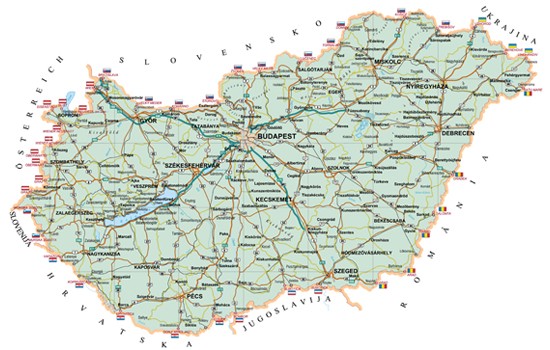Snapshot

Key facts
Hungary is a country of unique beauty in the heart of Europe. With its size of 93 thousand square kilometres and its location at the border of Eastern and Western Europe, the country is an optimal choice for doing business by small and multinational companies.
While the Hungarian language may not be similar to any other European language, the country has extensive and historically established relations with all three main European ethnic and linguistic families: the Indo-European, the Slavic, and the Neo-Latin languages. For this reason, Hungary is especially capable of acting as a bridge between various cultures – a feature highly appreciated by investors and businesses with a focus on comprehensive approaches.
Hungary has excellent conditions to offer for knowledge-based industries. Hungary is among the world leaders in terms of Nobel Prize winners per capita, with well trained labour force, graduates fluent in various languages, and a spectacular track record in terms of IT and software development (from John Neumann to Charles Simonyi and others).
Located at the juncture of the 4 main European transport corridors, Hungary offers over 1,100 km motorway, an extensive railway network, and five airports.
Hungary can capitalize on a few natural resources (bauxite, coal, and natural gas), as well as fertile soil, and natural thermal water reserves. Hungarian wines are enjoyed throughout Europe. The country‘s main manufactured exports include electric and electronic equipment, machinery, processed food, pharmaceuticals and chemicals.
Key facts
Founded: 896
Area: 93,030 sq km (about 36,000 sq miles)
Time Zone: GMT + 1 hour (CET; Central European Time)
Location: Central Europe
Borders: Austria, Croatia, Romania, Serbia, Slovakia, Slovenia, and Ukraine
Capital: Budapest
Official language: Hungarian
Most frequently used foreign languages: English, German
Population: about see current data
GDP: see current data
Inflation: see current data
Unemployment rate: see current data
Currency: Hungarian forint, Ft, HUF (current exchange rate data)
Government type: Parliamentary republic
OECD member: 1996
NATO member: 1999
EU member: 2004
Schengen area member: 2007
Britannica country report: Hungary
Good to know
Power supply: 220 V
Hungary uses the metric system for units of measurements.
Hungarian date notation: year/month/day.
Separation of numbers: Hungarian uses the comma as the decimal separator and the full stop as the thousand separator.
Hungarian names: family name comes first
Time Zone
Hungary is in the Central European Time Zone (CET), which is one hour ahead of Greenwich Mean Time (GMT). The country uses the practice of daylight saving time, advancing clocks by one hour during the period from the last weekend in March to the last weekend of October.
Distance between Budapest and some major European cities
Vienna, Austria: 217 km
Frankfurt am Main, Germany: 1,034 km
Rome, Italy: 810 km
Paris, France: 1,247 km
Prague, Czech Republic: 443 km
Warsaw, Poland: 545 km
Bucharest, Romania: 640 km
Kiev, Ukraine: 894 km
Amsterdam, the Netherlands: 1,145 km
Visa
The visa requirements of Hungary are in line with the provisions and recommendations of the EU and of the Schengen Convention. Visas and residence permits issued in other Schengen countries – just like visas issued by Hungarian diplomatic delegations – are valid in Hungary, and residence permits issued by Hungarian authorities are also valid for the entire Schengen area.

